Sous Vide Pork Tenderloin
This post may contain affiliate links. See my disclosure policy.
This easy sous vide pork tenderloin recipe is one of my family’s favorite ways to enjoy this lean cut of meat. Thanks to the precise temperature control, it’s never dry, impossible to overcook, and always perfectly juicy and moist.
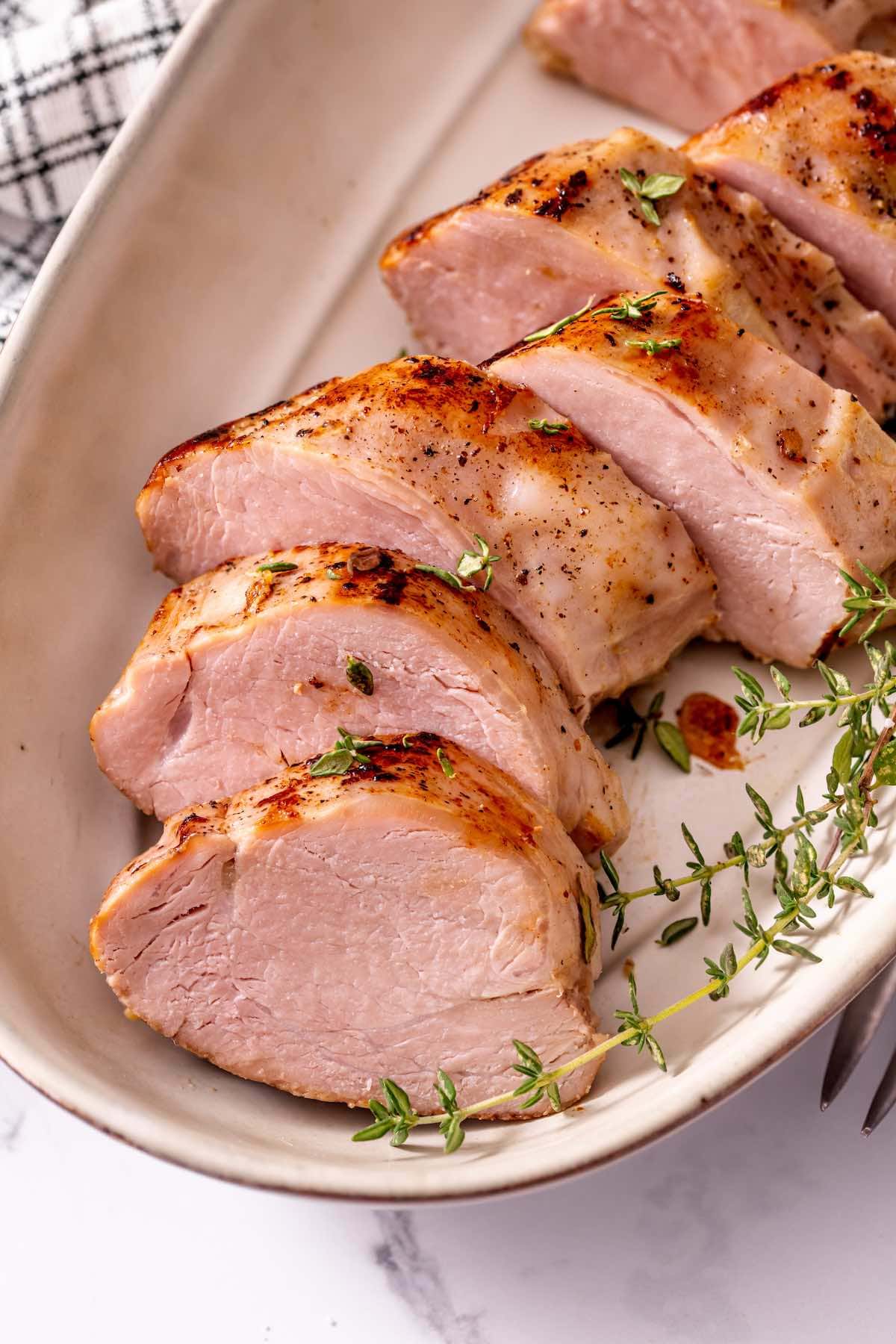
If you’ve ever struggled with cooking pork tenderloin perfectly, I have the solution- cook it in the sous vide. In culinary school, I learned several methods for cooking lean proteins like this, and it always comes down to the correct technique. While I enjoy using the air fryer or grill for pork tenderloin, the margin for error is tiny- just a few minutes can turn juicy pork into something overcooked and dry.
Cooking the pork tenderloin in a sous vide water bath, however, gives you the flexibility and control. You can let it cook for anywhere from 45 minutes to four hours, and still end up with juicy, tender pork every time. The best part? It’s almost entirely hands off- just set it and forget it.
Why I love cooking pork tenderloin in the sous vide

- Perfect texture. It’s juicy and tender.
- You control the cooking time. You can cook the pork for as little as 45 minutes or up to 4 hours (or any time between that).
- Easy to customize. Season the meat with your favorite marinade or sauce and cook it up!
Temperature for sous vide pork tenderloin
The ideal temperature at which to sous vide the pork all comes down to your personal preference. I find this pork tastes best when served medium, so cook at 140°F. However, see my chart below for the differences in temperature and doneness:
Medium rare: 135°F. The pork will be quite pink in the middle, but still safe to eat.
Medium: 140°F. As mentioned above, this is my preferred temperature. There is a touch of pink, but the meat will still be very, very juicy.
Medium-well done: 150°F. Still juicy, no visible pink in the middle.
Well done: 160°F. Juicy and tender.
Key Ingredients
Find the printable recipe with measurements below.
- Pork tenderloin. I prefer to get my pork loin from a butcher because they often have the skin intact, and you can request them to remove it there and then. Grocery stores tend to provide it skinless, which can dry out the meat before even cooking.
- Garlic. Crush the garlic cloves to help release more flavor.
- Thyme. Use a few sprigs of fresh thyme to make the pork aromatic.
- Shallots. Sliced onions add a mild flavor to the pork. You can omit them if you want to or use white onion instead. This onion variety yields a milder taste, but you can use white or yellow onion if that is all you have on hand.
- Butter. To sear the pork at the end. You can use olive oil or another cooking oil, but let’s be real- butter tastes better.
- Kosher salt and black pepper. To taste.
How to sous vide pork tenderloin
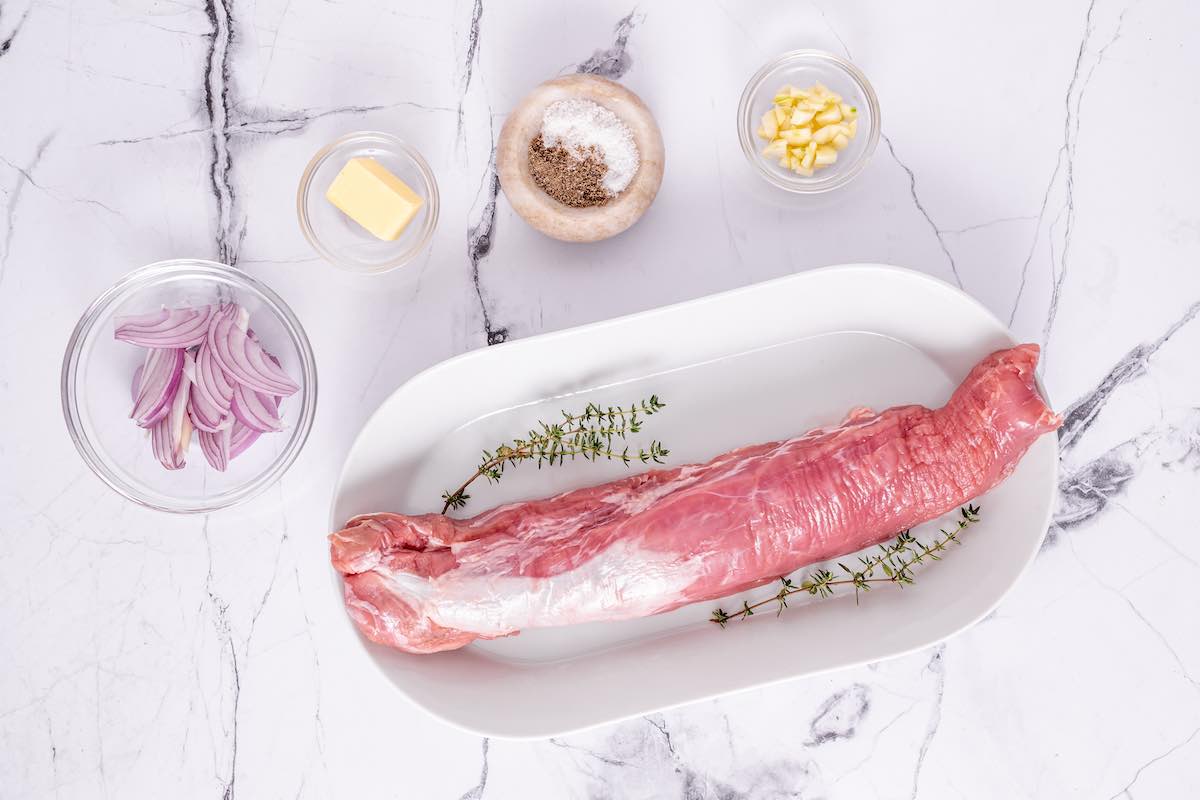
Step 1- Prep. Preheat the sous vide machine to 140°F. Pat the pork dry with paper towels.
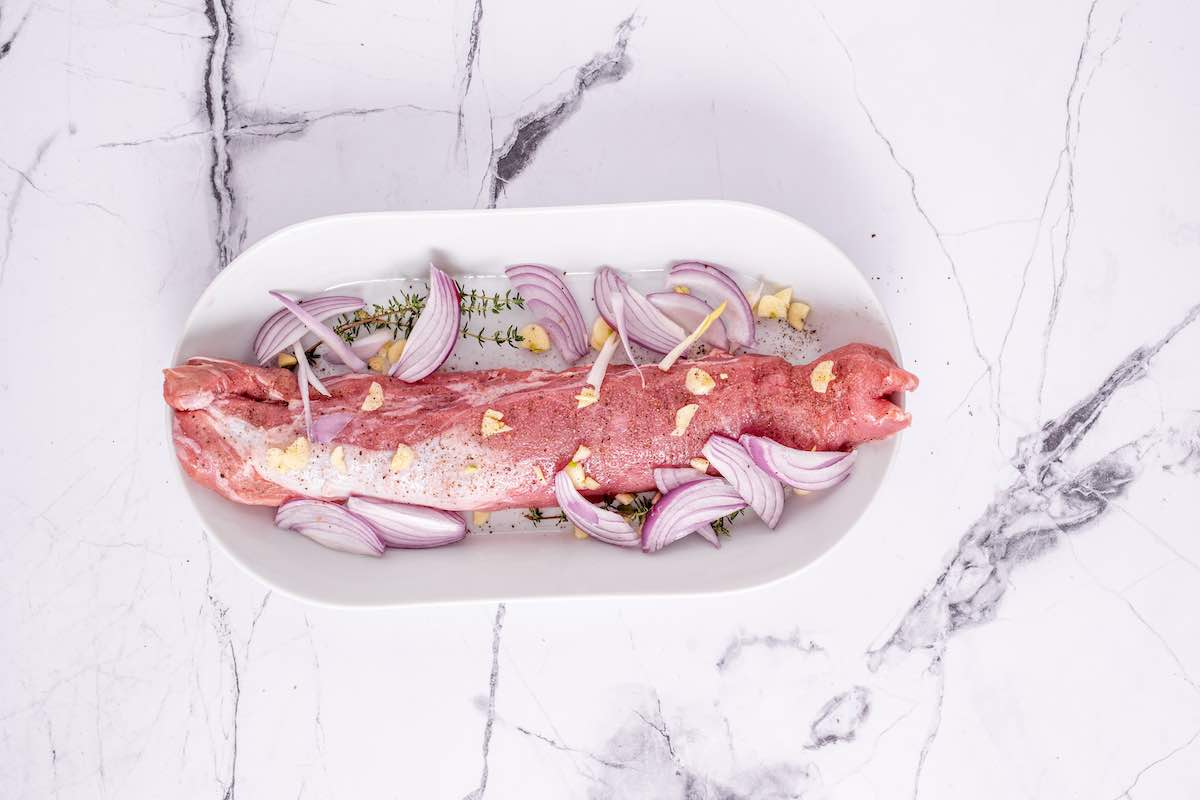
Step 2- Season the pork tenderloin with salt and pepper.
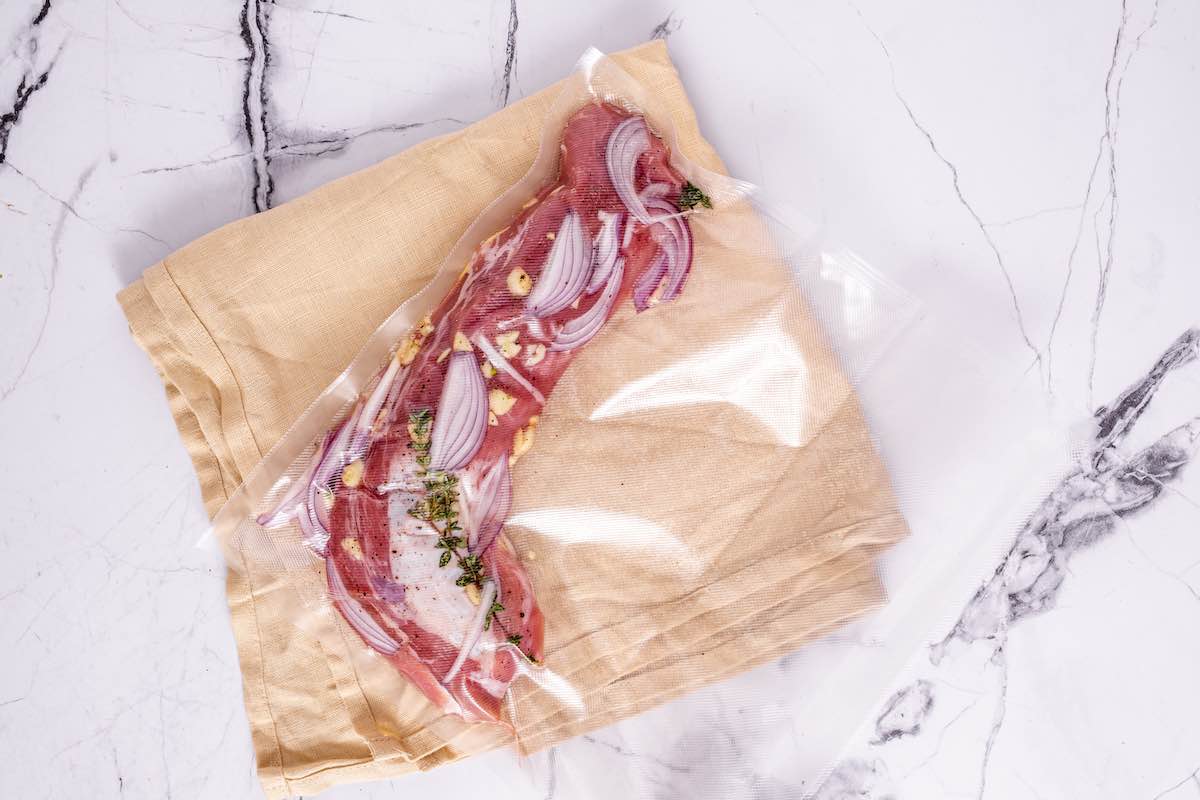
Step 3- Vacuum seal. Place it in a vacuum seal bag with thinly sliced shallots, crushed garlic cloves, and thyme sprigs. Seal the bag using a vacuum sealer.
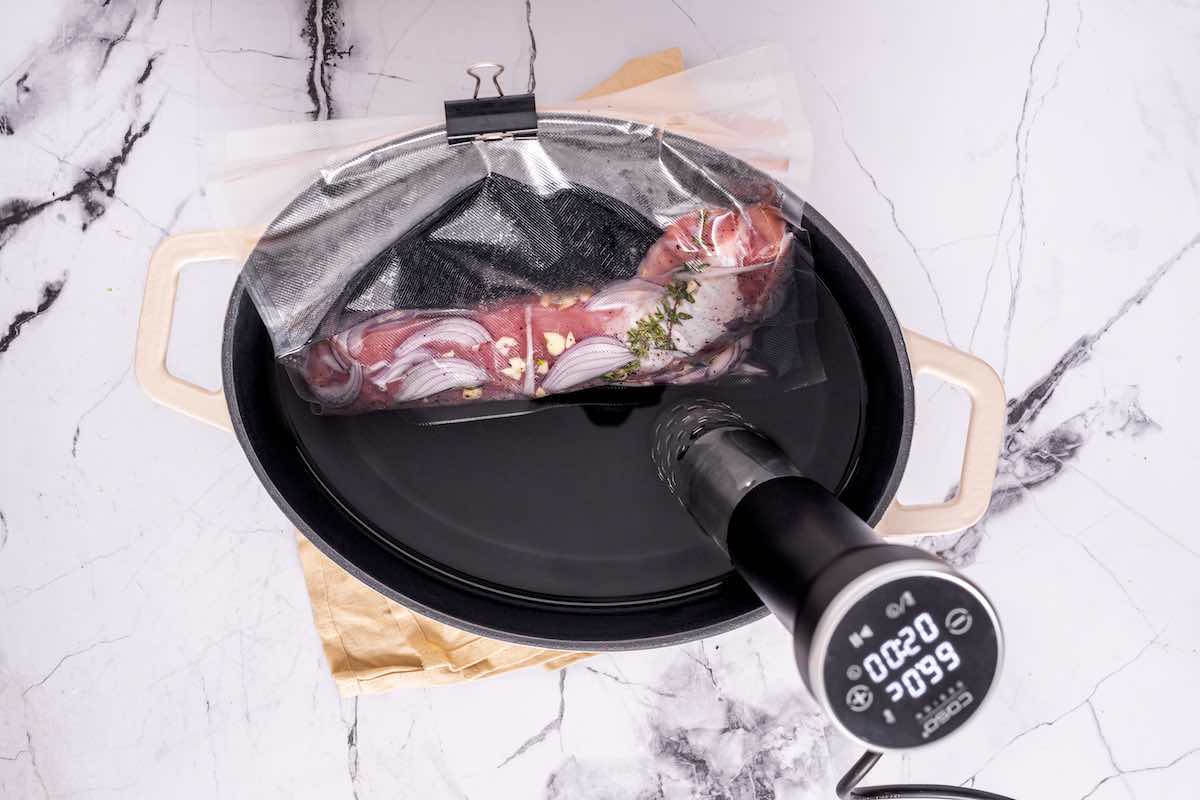
Step 4- Sous vide. Place the bag with the pork tenderloin in the water bath, ensuring it is fully submerged. Cook for at least 45 minutes or up to 4 hours.
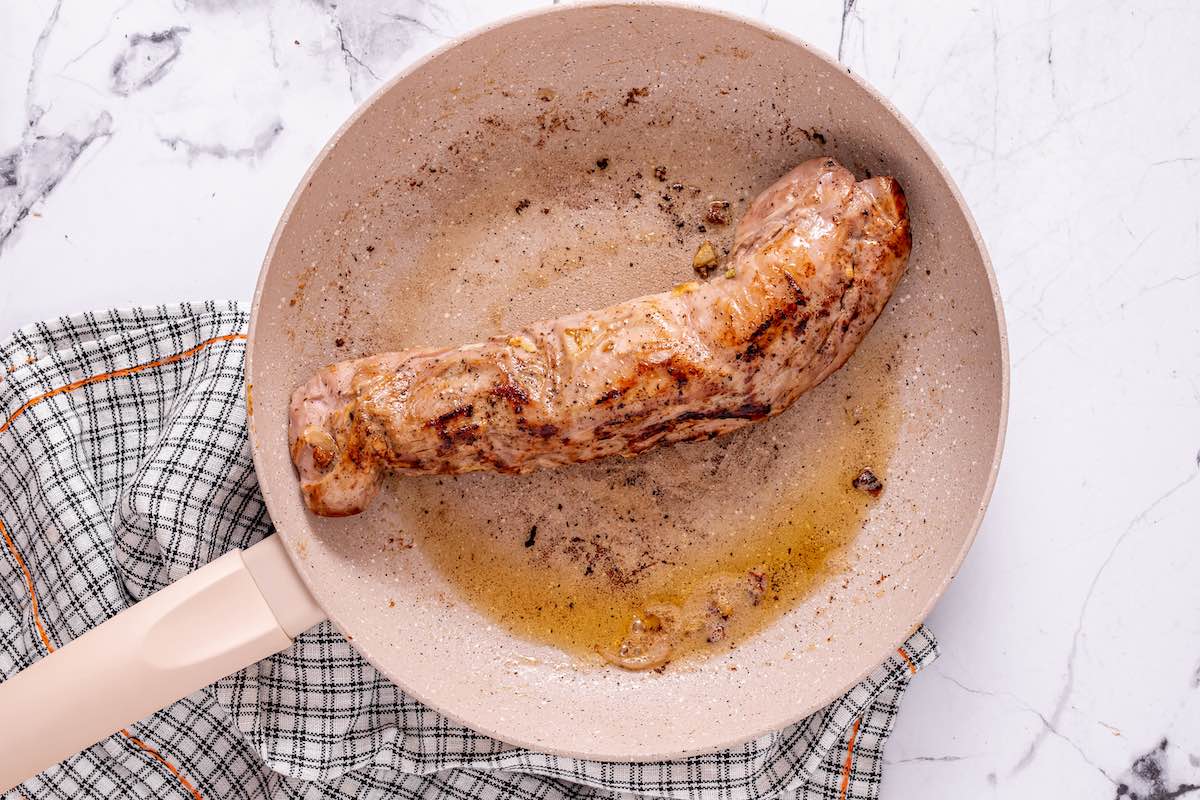
Step 5- Sear. Heat the butter in a cast-iron skillet or pan over high heat. Sear the pork tenderloin on all sides for about 2 minutes.
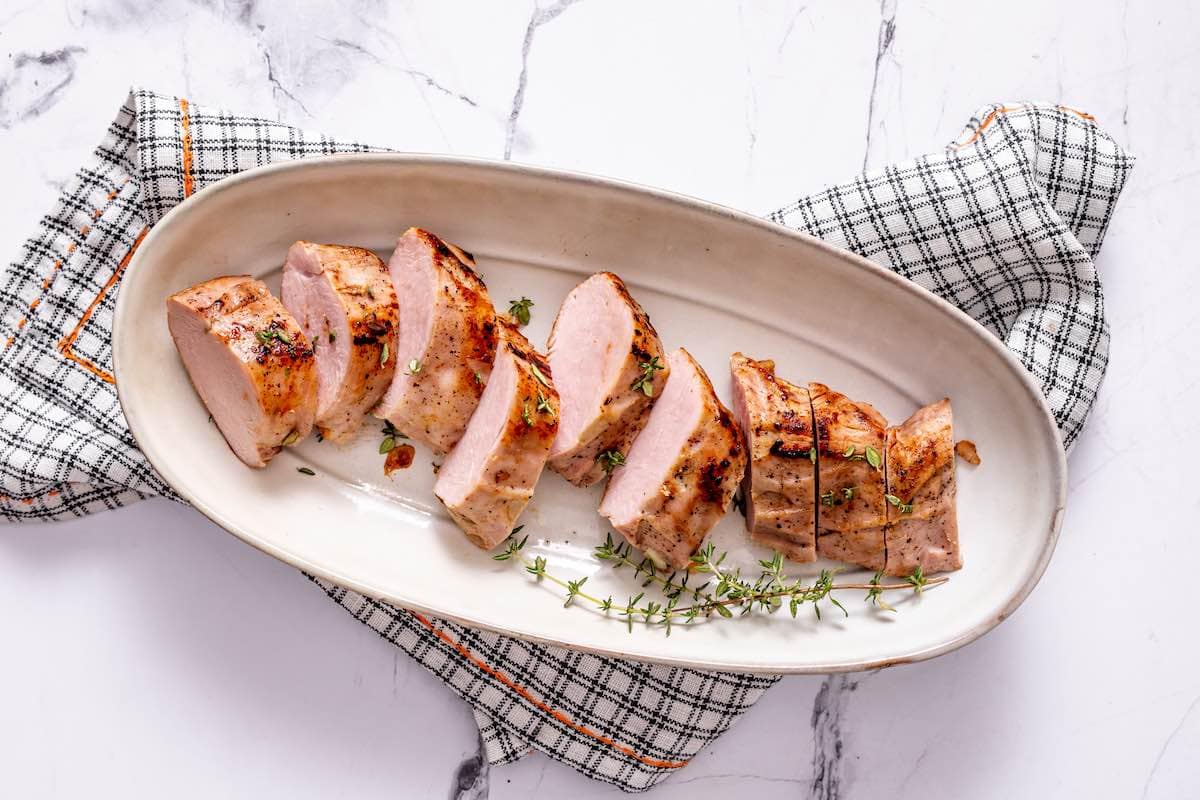
Step 6- Slice and serve. Slice the pork tenderloin and serve immediately.
Recipe tips and variations
- Be careful not to overcook the pork when searing it. Two minutes in total are enough to get a nice color on the cut from all sides.
- Be generous with the seasoning. Using a proper amount of salt and pepper is essential in bringing out the natural flavor of the pork.
- Use more aromatics when searing the pork tenderloin. A few cloves of garlic and a sprig of fresh rosemary (or other fresh herbs) added to the skillet will further enhance the flavor of the pork.
- Sear with a sauce. To amp up the flavor, I sometimes sear the cooked pork in BBQ sauce or some Dijon mustard. It forms a subtle crust and traps the juices in for one juicy pork tenderloin.
- Marinate it! You can add anything you like to the bag before the sous vide. Any marinade works, and I’m partial to my pork tenderloin marinade.
Frequently asked questions
Yes, you can. Compared to other cooking methods, using the sous vide is one of the best ways to cook frozen pork tenderloin. The temperature is the same as fresh pork, but the cooking time will differ. You’ll need to add 45 minutes to your usual cooking time. For example, if you usually sous vide for an hour, you’ll now cook the pork for 1 hour and 45 minutes.
Start by filling a large pot with water, then mount the thermometer to the side. Next, heat the water to the desired temperature and adjust the heat to keep the temperature steady. Now, prep the pork as instructed, then submerge it in the water bath. Cook the pork, sear it, then serve.
I don’t recommend skipping the sear. While the pork is already fully cooked, searing it over high heat gives the pork a gorgeous crust on the outside, which packs in that extra bit of flavor.
Technically, no. However, I found that cooking it longer than 5 hours started to break down the texture, resulting in mushy and slightly soft pork. This is why my recommended cooking time ranges from 45 minutes to up to 4 hours.
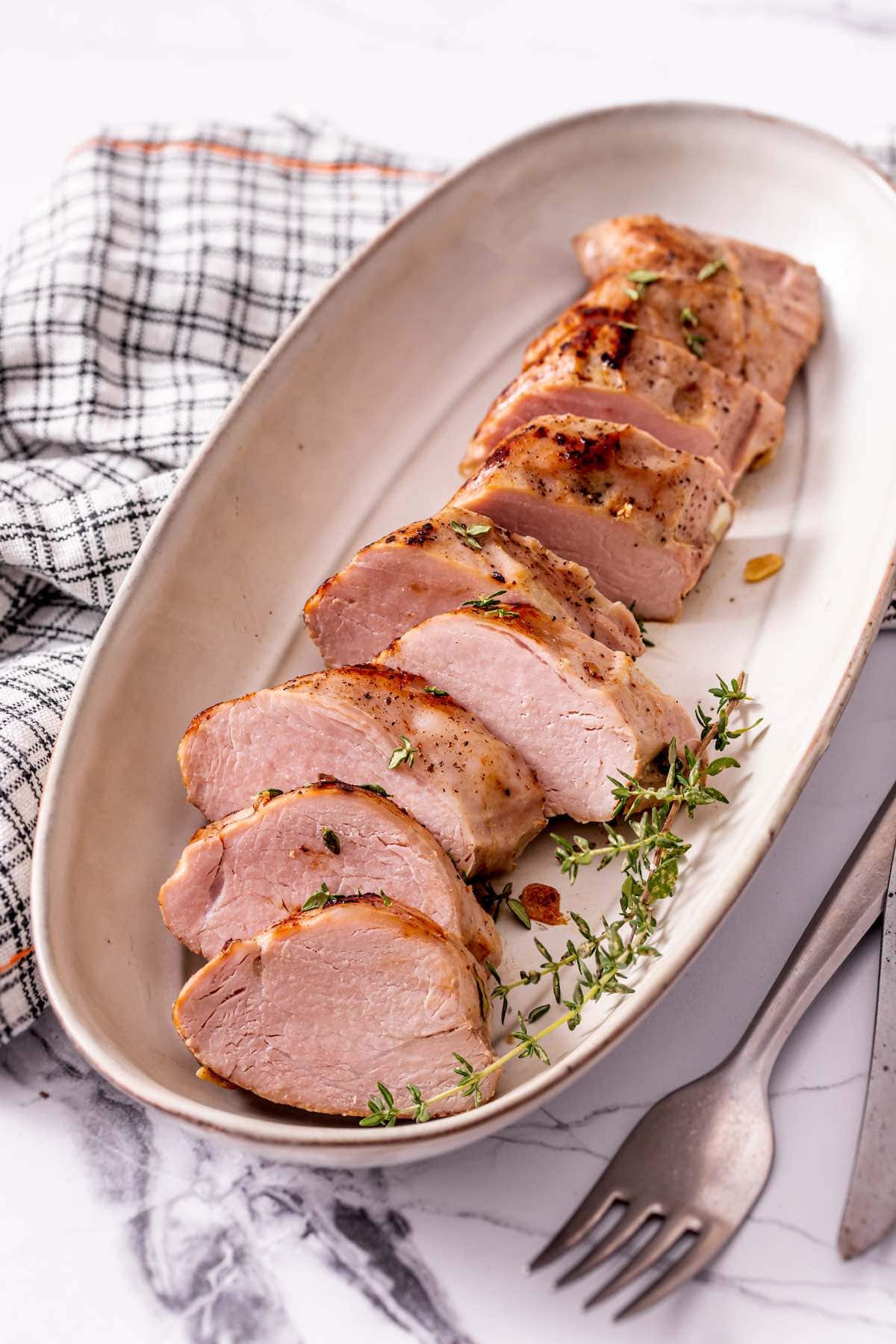
Storage instructions
To store: Leftovers can be stored in the refrigerator, covered, for up to five days.
To freeze: Place the cooked and cooled pork in a shallow container. Store it in the freezer for up to 6 months.
If you tried this Sous Vide Pork Tenderloin recipe, please leave a star rating and comment. It helps others thinking of making this.
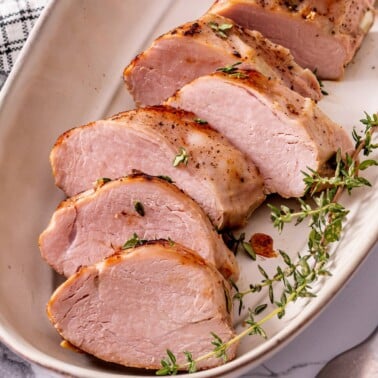
Sous Vide Pork Tenderloin
Video
Ingredients
- 1 pound pork tenderloin
- 1/2 teaspoon salt
- 1/2 teaspoon pepper
- 2 cloves garlic minced
- 1 small shallot thinly sliced
- 2 sprigs thyme
- 2 tablespoons butter
Instructions
- Preheat the water bath using the Sous vide machine to 140°F for medium-cooked pork tenderloin. For medium-rare, set the temperature to 135°F. For medium-well done, set it to 150°F. For well done, set it to 160°F.
- Season the pork with salt and pepper on all sides.
- Place the pork tenderloin in a vacuum bag with garlic, shallot, and thyme. Seal the bag with a vacuum sealer.
- Place the bag with meat in the water bath, totally submerged in water, and cook for at least 45 minutes or up to four hours.
- Remove the pork tenderloin from the bag and discard the herbs.
- Add butter to a non-stick skillet and sear the pork on all sides.
- Slice and serve immediately.
Notes
- Leftovers: Keep in the fridge for 5 days. You can also freeze it for up to 6 months.
- Reheating: Microwave portions of the pork for 30-40 seconds or warm up in a non-stick skillet until hot.
- Frozen pork tenderloin: Increase the sous vide time by 45 minutes.














Made this tonight just as the recipe instructed. It was simple and delicious! Thank you!
Aw, I love to hear that, Jenn!! Thanks for the lovely comment and star rating.
I just bought a Sous Vide awhile ago. I’ve not used it yet. I never wanted one because the idea of cooking in plastic bothered me, even with lower than boiling point temps. But I’ve collected a lot of silicone bags and am going to try cooking in them.
Please do, Karey- we have a ton of them 🙂